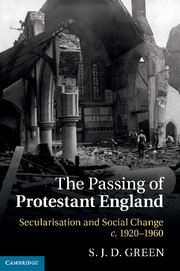Book contents
- Frontmatter
- Contents
- Acknowledgements
- Part I Outline of the problem
- Part II Disclosures of decline
- Part III Resistance, revival and resignation
- 6 The 1944 Education Act: a church–state perspective
- 7 Was there an English religious revival in the 1950s?
- 8 Slouching towards a secular society: expert analysis and lay opinion in the early 1960s
- Conclusion: the passing of protestant England
- Index
- References
7 - Was there an English religious revival in the 1950s?
Published online by Cambridge University Press: 10 January 2011
- Frontmatter
- Contents
- Acknowledgements
- Part I Outline of the problem
- Part II Disclosures of decline
- Part III Resistance, revival and resignation
- 6 The 1944 Education Act: a church–state perspective
- 7 Was there an English religious revival in the 1950s?
- 8 Slouching towards a secular society: expert analysis and lay opinion in the early 1960s
- Conclusion: the passing of protestant England
- Index
- References
Summary
Take them at their own estimate, and the confounded general reader must wearily conclude that most of the important truths about our supposedly common past have been revealed to ‘revisionist’ historians alone. Ancient wisdom once acknowledged how the ‘Fall of Rome’ plunged Western civilisation into centuries of darkness. Contemporary academic judgement prefers to describe a ‘world of late antiquity’. This, it is argued, emerged well before the eclipse of the western empire and survived long into the reign of Charlemagne. It can be understood without ‘involving an intervening catastrophe [or] pausing [even] to pay lip service to the…notion of decay’. Modern theorists once insisted upon the world-historical importance of the French Revolution, interpreted alternatively as the ‘End of History’ or the birth of freedom. More knowing scholars currently acknowledge little more than an aberrant interruption in the development of Europe's predominant pre-Victorian power. What such relentless learned correction – J. H. Hexter once identified it as the revisionist genre of ‘splitting’, by contrast with pre-revisionist ‘lumping’ – has made common in self-conscious professional predisposition towards so much of the distant past has now begun to strike a chord in fashionable accounts of more recent experience. Concerning no historical development is this divergence between self-conscious expert, pitted against increasingly bemused layman, more marked than about the fate of religion in the advanced societies.
There is surely no conventional wisdom more commonplace than the observation that we are now altogether a less faithful people than we once were.
- Type
- Chapter
- Information
- The Passing of Protestant EnglandSecularisation and Social Change, c.1920–1960, pp. 242 - 272Publisher: Cambridge University PressPrint publication year: 2010
References
- 1
- Cited by



